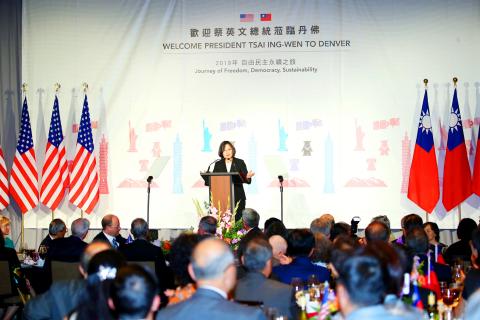President Tsai Ing-wen (蔡英文) on Friday told a large gathering of Taiwanese expats in Denver, Colorado, that Taiwan would not succumb to pressure, but would continue to safeguard its freedoms, democracy and sovereignty.
“Many of you here today are concerned about Taiwan’s future,” Tsai said, addressing the 700-plus Taiwanese guests at a banquet held in her honor during her stopover in Denver on the return leg of her visit to Taiwan’s four diplomatic allies in the Caribbean.
Many people are anxious because China is perceived as closing in on Taiwan and has resorted to a carrot-and-stick approach to pressure Taiwan’s 23 million people into accepting its “one country, two systems” model, Tsai said, mostly in English, but with some Mandarin and Hoklo (commonly known as Taiwanese) thrown in.

Photo: CNA
Feelings of anxiety have been heightened by the sight of Hong Kong gradually losing its freedoms and democracy, she said, referring to massive protest triggered by an extradition bill that would allow the Hong Kong government to extradite criminal suspects to China.
“That has us worried about whether Taiwan’s sovereignty and democracy will also disappear,” Tsai said at the banquet, which was also attended by American Institute in Taiwan Chairman James Moriarty, Colorado Governor Jared Polis, US Senator Cory Gardner and US Representative Doug Lamborn.
Tsai said that China’s suppression of Taiwan has been evident throughout her trip, including several complaints that Beijing lodged with the US government.
It has also shown up as information warfare, or disinformation, used to infiltrate Taiwanese society, she said.
“Next year will be a critical time for us to safeguard Taiwan’s democracy,” Tsai said, urging Taiwanese expats to return home next year to vote.
Solidarity is needed in the fight to protect Taiwan’s democracy and way of life for future generations, said Tsai, who is seeking re-election.
Arriving at about 3pm on Friday in Denver — the last leg of her 12-day overseas visit, including a stopover in New York City — Tsai and her delegation were received by Moriarty and Representative to the US Stanley Kao (高碩泰).
Prior to Tsai’s arrival, hundreds of Taiwanese expats had gathered outside the Hilton Denver City Center, where she was to stay.
Many waved the national flags of the Republic of China and the US, while others held banners that read: “Taiwan,” or bore slogans such as “Freedom and democracy, safeguard Taiwan.”
About a dozen Chinese protesters demonstrated near the hotel, waiving the People’s Republic of China national flag and chanting: “One China.”
No clashes occurred.
Tsai’s itinerary yesterday included visits to the National Renewable Energy Laboratory, a US federal laboratory dedicated to renewable energy development, and the National Center for Atmospheric Research, which developed Formosat-7, the second satellite cluster jointly built by Taiwan and the US.
She is scheduled to arrive in Taiwan tomorrow.

The Grand Hotel Taipei on Saturday confirmed that its information system had been illegally accessed and expressed its deepest apologies for the concern it has caused its customers, adding that the issue is being investigated by the Ministry of Justice Investigation Bureau. The hotel said that on Tuesday last week, it had discovered an external illegal intrusion into its information system. An initial digital forensic investigation confirmed that parts of the system had been accessed, it said, adding that the possibility that some customer data were stolen and leaked could not be ruled out. The actual scope and content of the affected data

‘LIKE-MINDED PARTNER’: Tako van Popta said it would be inappropriate to delay signing the deal with Taiwan because of China, adding he would promote the issue Canadian senators have stressed Taiwan’s importance for international trade and expressed enthusiasm for ensuring the Taiwan-Canada trade cooperation framework agreement is implemented this year. Representative to Canada Harry Tseng (曾厚仁) in an interview with the Central News Agency (CNA) said he was increasingly uneasy about Ottawa’s delays in signing the agreement, especially as Ottawa has warmed toward Beijing. There are “no negotiations left. Not only [is it] initialed, we have three versions of the text ready: English, French and Mandarin,” Tseng said. “That tells you how close we are to the final signature.” Tseng said that he hoped Canadian Prime Minister Mark Carney

President William Lai (賴清德) yesterday bestowed one of Taiwan’s highest honors on Saint Vincent and the Grenadines (SVG) Ambassador Andrea Clare Bowman in recognition of her contributions to bilateral ties. “By conferring the Order of Brilliant Star with Grand Cordon on Ambassador Bowman today, I want to sincerely thank her, on behalf of the Taiwanese people, for her outstanding contribution to deepening diplomatic ties between Taiwan and SVG,” Lai said at a ceremony held at the Presidential Office in Taipei. He noted that Bowman became SVG’s first ambassador to Taiwan in 2019 and

A man walks past elementary school artworks at the Taipei Lantern Festival in Ximen District yesterday, the first day of the event. The festival is to run from 5pm to 10pm through March 15.